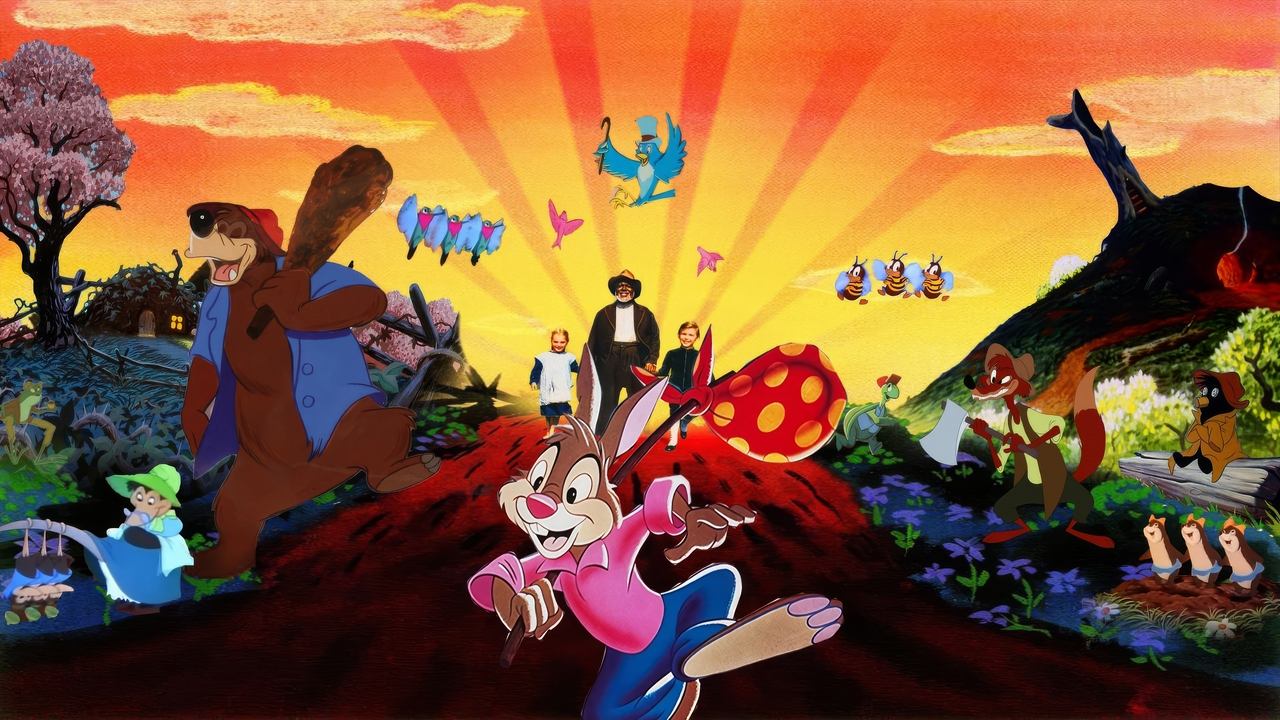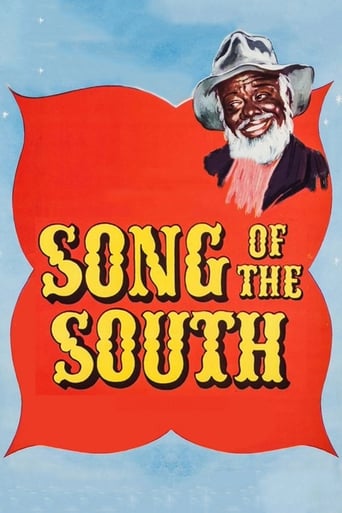

Lack of good storyline.
... View Moreeverything you have heard about this movie is true.
... View MoreAt first rather annoying in its heavy emphasis on reenactments, this movie ultimately proves fascinating, simply because the complicated, highly dramatic tale it tells still almost defies belief.
... View MoreA film of deceptively outspoken contemporary relevance, this is cinema at its most alert, alarming and alive.
... View MoreLet's begin Channel Awesome Month to celebrate their tenth year anniversary! This film was reviewed by Cinema Snob. It was great to see a movie so rare. Hey, they say that "The Day The Clown Cried" is going to be eventually shown sometime now! The best parts of this film are easily the animated bits. This is one of the earliest examples of animation blending with live-action and these are effects that really do hold up!Well, everything is CGI nowadays. I admit that the story could have been better, but Uncle Remus is still a good character. I managed to read a kid's book version of the bit with the tar baby. Kind of strange how one of the most seemingly offensive parts would be more mainstream. I guess the child actors could be better, but this is still quite fun. They actually rereleased this film half a dozen times and even have a theme park ride based on it! ***
... View MoreA gentle, family-friendly story about a boy's adventures in rural Georgia, "Song Of The South" blends animation segments with live action. Though the protagonist is a seven year old boy named Johnny (Bobby Driscoll), the heart and soul of the film belongs to an elderly Black man, named Uncle Remus (James Baskett). Animated characters include Br'er Rabbit, Br'er Fox, and the Tar Baby, and are used by Uncle Remus to teach Johnny truths about life. The most frequently mentioned truth, and the underlying theme of the film, is that "You can't run away from trouble".It's an unfortunate truth that the film itself can't seem to run away from trouble, as it has been branded racist almost from the beginning. Owing to pressure from the politically correct crowd, the Walt Disney Corporation still refuses a broad release of the film in its entirety here in the U.S., concerned as it is with its public image and its financial "bottom line".Such selfish censorship is deplorable. The story's setting is post-Civil War America, not the antebellum era. Further, the use of Black dialect is wonderfully genuine, and teaches us a truthful history. And the character of Uncle Remus is as admirable and magnanimous, or more so, as any contemporary story protagonist of any race.If I had to render a criticism of the film, it would be the sound and its visuals. On the copy I watched the sound was a tad muffled, probably due to antiquated sound equipment. And the color cinematography at times seemed blurry and had poor lighting contrast.Ideally, this film would be removed from Disney Corporation's control, and placed in the public domain. That's unrealistic. But, nevertheless, viewers can still find ways around the pious censorship.With its upbeat signature song. "Zip-a Dee-Doo-Dah" and its Oscar worthy performance by James Baskett, "Song Of The South" makes for great viewing by people from age 3 to 103 of all races.
... View MoreThe bastard child of the Disney musical cannon Song Of The South has a history so littered with controversy that it is a rather difficult film to talk about. I mean, what is left to be said that hasn't already been said before?I suppose, however, a good place to start is to talk about why on earth I decided to spend my time watching it in the first place. Well, for starters I have to be honest and come right out with the fact that I threw this film into the player largely because it is so controversial. I mean, a movie that Disney has refused to release of home video within the United States, how could I go past that? Secondly, the movie does have a significant amount of historical value in the way in which it weaves live action footage (shot brilliantly in glorious Technicolor) together with animated sequences, and also in that it provides an interesting look at a particular part of society's revisionist version of the reconstruction period in the South.The plot itself is rather simple: a young boy (Bobby Driscoll) and his mother (Ruth Warrick) come down to Georgia to stay on a plantation where they meet Uncle Remus (James Baskett). Remus is a former slave and full- time story teller who throughout the film relates the old folk-tales of Bre'er Rabbit and Bre'er Fox to young Johnny in order to help the boy sort out his personal problems. Really, it's not the world's most interesting plot, but it serves well for the purposes of the film with Remus's stories sweeping from live action into animation with easy grace.The problems with this plot, however, arise quickly with the meeting of old Uncle Remus, who presents as an amalgamation of almost every racial cliché one could imagine. Not a good starting point to be sure. The other African-American characters too are presented in a very poor light, playing off the common prejudices around at the time. Their speech is hokey and sounds almost like it was torn straight from the script of a minstrel show, they sing traditional songs (with the director's showing no sensitivity to the cultural implications of such music) as they go about their work, and they are all costumed in the manner one would have expected from D.W. Griffith's The Birth Of A Nation (1915). The film also gives an incredibly naïve and revisionist view of black-white relations at the time, showing benevolent masters and servants contented with their roles of servitude.None of this is maliciously intended, I would wager, but nonetheless it is very problematic especially for an ostensible children's film, and I agree wholeheartedly with the NAACP's calls to boycott the movie when it was first released. I think the very fact that it not deliberately and maliciously offensive towards the people it marginalises makes it all ever worse. I mean, a child can easily be taught that hatefulness and overt racism are unacceptable, but to be shown such an insidious example from such a trusted source as Disney can provide a challenge for a parent to explain away. The movie contains no message or moral of equality, just a sly suggestion that 'certain people' should know their 'place'.I do not, however, agree with any calls to forget this film entirely. It has earned a place in the historical cannon of feature films and as such is deserving of study, analysis, and critical thought regarding its artistic merits. Song Of The South has a definite place in film libraries and the collections of students and historians, and I think that it is a place that needs to be preserved and not glossed over. I would just recommend that it be kept out of the hands of children.As an aside to this discussion of the film's problematic racial presentations I will also say that I have scored this film rather low for the simple fact that it is boring. It really doesn't quite reach the same heights of grand magic that Disney films often do. The story is fractured and episodic, making it hard to become invested in the plight of the characters, the songs (bar one) are not particularly memorable, and, to be honest, the primary protagonist is unlikeable. It's not poorly executed, in fact some of the location shooting and technical trickery is actually rather inspired, but it is poorly constructed as a film.So, in conclusion, I'm going to have to express my ambivalence towards this movie. It has some artistic merits, but these are tempered by a series of filmic shortcomings, and it has a definite degree of historical and cultural value, but that comes primarily from the fact that it is really rather racist.I suppose the only thing you can do is watch it for yourself and make up your own mind about how much value one can ascribe to this outcast from the Disney family.
... View MoreI believe it has been about 30 years since I've seen this film. One may think this banned Disney feature with only some portions of it animated would have a cult status. The ban is by Disney itself, and it is not a cult film because on it's own it is just another nice children's film. Watching for the first time as a grown adult, I could identify the signature weepy music and somewhat adult undertones. The animation was fine, the rabbit reminded me of the rabbit in Winnie the Pooh.The happy tone is what you expect for a children's film, offset by upsets, such as a Mother denying a child's wish to have a puppy. But the absence of this film in recent memory left a hole in my childhood recollections. Having been able to view a great transfer recently, I could appreciate the innovative mix of live action and animation (for only half of the running time). The effect looked very clean for the time period, and this digital copy made all the live characters very vivid.The character Uncle Remus won the actor an Academy Award, portraying a gentle and caring man, who becomes a surrogate father while the boy is staying at a southern plantation. That warm feeling is part of what the Disney 'magic' was all about back then. Ultimately, this film is geared for too young of an audience to be as solid of a classic as their many more popular films. But it has a right to be a part of our memories, and banning the film dishonors the performances and the art of this classic.
... View More